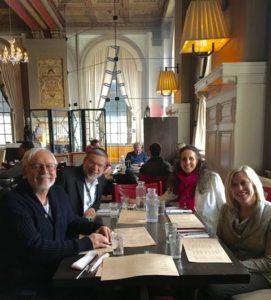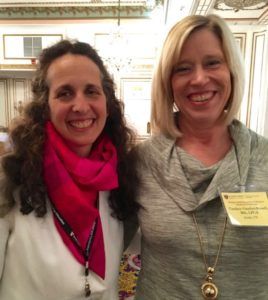
It’s a high moment.
We sit around the oak table in the Oak Room in Boston’s Fairmont Hotel, Copley Square. Harvard Medical School’s CME writing and publishing course has just ended and the air seems charged with enthusiasm and insights.
I am with three clients—Dr. James Zender, expert in auto accident recovery; and two participants in my Bring Your Book to Life® Program, grief expert Candyce Ossefort-Russell and Alan Rozanski, MD, pioneer of Behavioral Cardiology and author of over 200 academic articles and research studies.
We share the takeaways, the shifts, the new ideas.
We brainstorm on the structure of Alan’s book. Alan could write a dozen books and still have more research to share. His challenge? To pare it down to the one theme of this book, yet give readers all the tools they need to implement—and stick with—the health strategies he offers.
James shares the new platform-building initiatives he is planning after speaking with an interested agent.

Candyce shares how she’d been working on her book on and off for five years until the aha moment swimming at the Y when she realized that if she died that day her only regret would be not having written and published her grief book.
If you missed the course, I hope to share a few insights during the next few days. Today, Candyce, Alan and James offer their takeaways:
Alan Rozanski, MD found himself inspired, “to be among a sea of like-minded individuals in the health field.” Alan returns home clearer on “the need to build a platform and develop a strategy for developing a social media presence.” He now plans to develop both a website and blog. His takeaways:
- “It’s important to put yourself in a situation where you need to pitch your book. It helps you refine the idea.”
- “I learned from Rusty Shelton that a website needs to gives visitors a clear action step. I’m now working on a short ebook that helps readers assess and improve their current vitality.”
- “I realized how important it is to connect with people in the book industry in order to develop an action plan for success. In addition to my book coach, Lisa Tener, there were agents, publishers, a publicist and many types of editors. Just from my 70 second pitch, an agent requested to see my proposal when it’s done.”
Candyce Ossefort-Russell shared this:
- “I learned from Dr. Julie Silver that I need to be able to describe my book in one sentence. This challenge forced me to become extremely clear in my own mind about what I’m writing about, which makes my book writing more focused; and having this powerful sentence makes it much easier to share with anyone what my book is about.”
- “Rusty Shelton made it clear that social media is not just about numbers. It can be used to build relationships with people I find interesting. Kristin Meekhof expanded on this idea by saying she used gentleness and gratitude to build her online relationships. The idea of building relationships with gentleness and gratitude makes the whole prospect of building my platform a positive challenge instead of a necessary evil.”
- “Kindra Hall presented a novel way to think about anecdotes. The typical writing advice is to show instead of tell. By giving us the storytelling basic formula of Normal ->Explosion -> New Normal made the idea of showing come alive in a new way.”
Dr. James Zender’s favorite tips:
- “Our brains are wired to connect to stories so the best lectures and writing utilize that structure. Easy to say and easy to forget, but critical to drawing in readers.”
- “With the extreme highs and lows one can experience writing a book and book proposal, having a book coach can be a better mood stabilizer than Lexapro!”
I first met Dr. Zender at the conference two years ago. In addition to working together on his book proposal, he has been working assidously on his platform as an author. He developed a new website for auto accident survivors and other audiences, became a blogger for Psychology Today (publishing 18 posts, half of which were featured as “essential reads”), developed a lecture series, keynoted at a conference and spoke at several others, applied to speak at several other national and international conferences, and was interviewed for a series of podcasts by McGraw Hill’s Professional Insights Blog.
If you attended the course for the first time this year, let Dr. Zender be an inspiration to you. List your planned activities for the year. Prioritize them. Implement them. Check them off. From building a website to blogging to writing a book proposal, you can do it!
But you can’t do it all at once. Make a plan that’s do-able. Figure out what you’ll give up to make the time for this. Schedule specific times to work on your book, proposal and platform, each individually.
Course attendees: Share your takeaways and aha moments!

